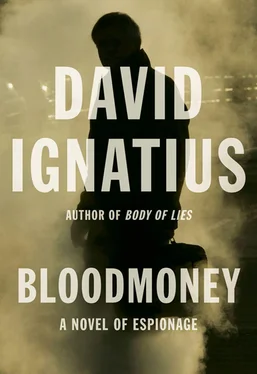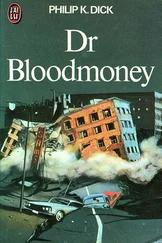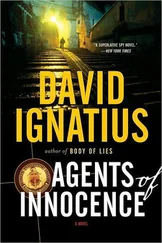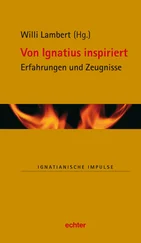David Ignatius - Bloodmoney
Здесь есть возможность читать онлайн «David Ignatius - Bloodmoney» весь текст электронной книги совершенно бесплатно (целиком полную версию без сокращений). В некоторых случаях можно слушать аудио, скачать через торрент в формате fb2 и присутствует краткое содержание. Жанр: Шпионский детектив, на английском языке. Описание произведения, (предисловие) а так же отзывы посетителей доступны на портале библиотеки ЛибКат.
- Название:Bloodmoney
- Автор:
- Жанр:
- Год:неизвестен
- ISBN:нет данных
- Рейтинг книги:4 / 5. Голосов: 1
-
Избранное:Добавить в избранное
- Отзывы:
-
Ваша оценка:
- 80
- 1
- 2
- 3
- 4
- 5
Bloodmoney: краткое содержание, описание и аннотация
Предлагаем к чтению аннотацию, описание, краткое содержание или предисловие (зависит от того, что написал сам автор книги «Bloodmoney»). Если вы не нашли необходимую информацию о книге — напишите в комментариях, мы постараемся отыскать её.
Bloodmoney — читать онлайн бесплатно полную книгу (весь текст) целиком
Ниже представлен текст книги, разбитый по страницам. Система сохранения места последней прочитанной страницы, позволяет с удобством читать онлайн бесплатно книгу «Bloodmoney», без необходимости каждый раз заново искать на чём Вы остановились. Поставьте закладку, и сможете в любой момент перейти на страницу, на которой закончили чтение.
Интервал:
Закладка:
David Ignatius
Bloodmoney
Revenge, at first though sweet,
Bitter ere long back on itself recoils.
- JOHN MILTON, PARADISE LOSTFirst, you push on your territories, where you have no business to be, and where you had promised not to go; secondly, your intrusion provokes resentment, and resentment means resistance. Thirdly, you instantly cry out that the people are rebellious and their act is rebellion… Fourthly, you send out a force to stamp out rebellion; and fifthly, having spread bloodshed, confusion and anarchy, you declare with your hands uplifted to the heavens that moral reasons forced you to stay: for if you were to leave, this territory would be left in a condition which no civilized power could contemplate with equanimity or with composure.
- VISCOUNT JOHN MORLEY, STATE SECRETARY FOR INDIA, 1905-1910, summarizing the anger of Pashtun tribesmen; quoted in C. F. Andrews, The Challenge of the North West Frontier, 1937MAKEEN, SOUTH WAZIRISTAN
This is Omar’s last night in Makeen. He will have dinner with his family and then return to his computer laboratory in Islamabad, and his brothers Nazir and Karimullah will go back to their fighting. Arab guests who have taken refuge in Makeen will share their meal this night, and the malik will visit to say goodbye to “Ustad Omar,” as they call him, the wise Omar who has visited places like Dubai and London, which the people of Makeen can barely imagine.
Omar and his youngest brother, Karimullah, have been walking in the high hills above the town before dinner. Omar is nearly forty, and a city man now, whose knees ache as he climbs the rocky escarpment and whose lungs gasp for breath when he stands atop the ridgeline, only the thorny shrubs of acacia for cover. Karimullah is nimble, too much so, his brother thinks, hardened to muscle and bone by the years of war in these mountains. The boy looks like a wolf: narrow-faced, relentless, ravenous for the kill.
Omar looks down from the ridge across the rock-strewn panorama of his valley. The tall pines soften the landscape; they cover the boulders and the ruined fields and the craters where the bombs have exploded. There is the slightest trickle in the riverbed that skirts the hillside; not enough water there to sustain anything except hatred. This is not my land, he thinks. Not anymore. Omar has escaped to another world that regards barren mountains as free-fire zones, and where social networks are not the intimate bond of tribe and blood, but things that come out of a machine.
They are descending the ridge now. Karimullah has his gun, as always, and he takes aim at a bird that has flushed from the brush and is careening toward them. The young man could shoot it in an instant, Karimullah never misses, but he puts the gun down and smiles at his brother: What is our quarrel with this bird?
Omar looks down the hillside again, at the fruit trees and vegetable gardens that his father has worked so hard to cultivate. I am the fruit, Omar thinks. I was nurtured in this place so that I could escape. All those afternoons as a boy, doing number games in the courtyard while his father, Haji Mohammed, wondered if there was something wrong with his oldest son; all those nights when he lay awake with the number puzzles illuminated in his mind like electric lights; all those mornings when he didn’t know whom to tell: Those were the signposts to his flight. He had tried to explain it once to an American friend, what it had been like to be a boy in his village, and the man, a mathematician, too, had just laughed in incomprehension.
Karimullah whispers in his brother’s ear. He has a secret. He takes the older man down a switchback in the trail, to an abandoned outpost of the Frontier Corps where the young warriors train. They have a simple shooting range to practice with their Kalashnikov rifles, and a room where they do exercises to make themselves strong. Omar tells his brother to be careful. These Americans are dangerous people. The attack on their towers in New York has made them crazy.
Yes, Karimullah knows. He and Nazir are not afraid of these half-men of America. He repeats a Pashtun saying that Haji Mohammed has taught his sons: “Who today is disgraced, tomorrow is lost.”
They are almost home. Karimullah is running ahead now to tell their mother that they are back, so that she can prepare the meal. The light is dying in the afternoon. The mountains are pink where the sun hits the ridges and, in the shadows, deep purple and cherry-black. The sky is a cold dark blue; the moon is up, but the stars are not yet visible. Omar looks up by reflex. The sky is empty, he thinks, but then a ray of the disappearing sun catches something in the sky, a ping of light. He shouts to his younger brother, but he is too far ahead to hear now. The guests are already gathering; their trucks are parked in front of the walled compound.
It is impossible, Omar thinks. These demons will not harm my family. I have tried to help them. Even my brothers and the other fighters: What have they done to America?
Omar begins to run. He has been thinking about what he will say tonight to his father and his brothers, but now his subtle mind is no more capable of forming a thought than that of an animal on the run. He can hear the sound: It is the faint throb of an engine and he wants to think it is coming from town, down the road a few miles away, but it is sharper and more persistent. He looks up again, and he knows with the instinctual certainty of the hunted that the sound is coming from the sky, ten thousand feet above.
He cries out to his brother as he runs toward the walls that contained his life when he was a boy, and that now shelter his mother and sisters and the young children. Another truck is arriving for the dinner, kicking up dust, and Omar is wailing for his brother now as loud as he can, screaming for his attention. But it is too late; the light is gone, and each frame of time is too short. The whisper overhead has become the relentless hum of a giant indestructible insect.
Karimullah has stopped. He hears the sound, too, and he is looking to the sky. He raises his gun instinctively, but it is useless and he begins to run. The gates of the compound burst open and members of his family try to dash away, tumbling in their robes, calling on God. They are helpless. They cannot see what is overhead, but they sense it from the sound, and they experience the degradation of fear. Their bowels give way, they stumble and fall; the little ones put their hands over their ears, as if that will stop what is coming. Haji Mohammed does not run. He is a man; he walks slowly and deliberately from the compound, holding the hand of one of his guests.
Omar is on the ground now, and he sees the sudden shadow of a metal arrow darken the orchards. The fire dragon is descending, but he cannot hear its roar. It is moving faster than its sound. It is so quick, this last moment, no more than the blink of the eye and it is too late. The trees bend and the grass goes flat and the animals bellow for help, and the people of Omar’s world are stopped in time.
The flash of detonation is white sulfur. The air is sucked into the mouth of the explosion and the fireball rises in an instant to the height of the surrounding mountains. The force of the explosion throws Omar into the air like a clod of dirt. He is unconscious for a time, and at first when he awakes, he cannot hear and cannot see and he thinks he must be dead. The world is white, and he is happy to be gone.
Pain tells him he is alive. Several bones are broken, and he is bleeding from many wounds. He begins to cough up dust and blood. When he opens his eyes, he sees that the world in which he was raised has been destroyed. Where his family compound stood is now rubble dotted by smoldering fires. He can see body parts a few yards from where he is lying, and he hears the cries of the wounded. He tries to stand, but he cannot support the weight.
Читать дальшеИнтервал:
Закладка:
Похожие книги на «Bloodmoney»
Представляем Вашему вниманию похожие книги на «Bloodmoney» списком для выбора. Мы отобрали схожую по названию и смыслу литературу в надежде предоставить читателям больше вариантов отыскать новые, интересные, ещё непрочитанные произведения.
Обсуждение, отзывы о книге «Bloodmoney» и просто собственные мнения читателей. Оставьте ваши комментарии, напишите, что Вы думаете о произведении, его смысле или главных героях. Укажите что конкретно понравилось, а что нет, и почему Вы так считаете.












